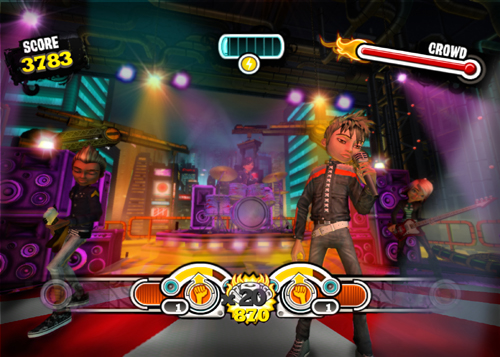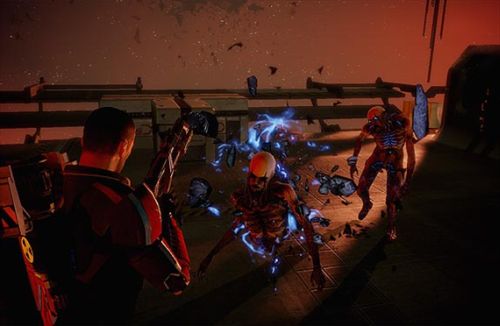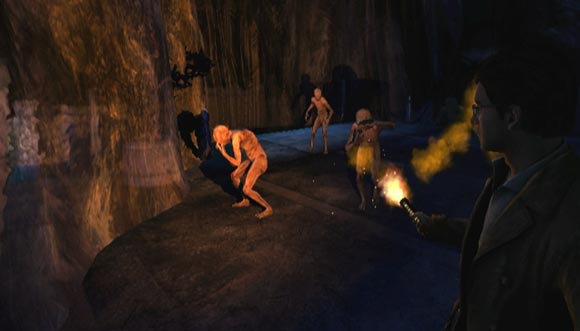Different sites have different mandates on the subject of at what point a review should be written. I used to believe that a reviewer should experience a game in its entirely before they could reasonably pass judgment. It is a view that has slowly eroded recently, leaving me unsure as to my own principles and questioning at what point I am qualified to write a review.
Initially my concept of finishing a game before reviewing was solid, every game on my own site has always been completed before anything was written. But playing Ultimate Band for review on Game People threw all of this in to question. Playing the Disney rhythm game I could be found repeatedly pumping my Wii remote above my crotch with no penalty for my constant, rhythmic ‘strumming’ which didn’t even come close to emulating the onscreen beat. I finished around half the songs offered with a variety of instruments, and concluded that it was fair to say I had seen enough.

It was peculiar how divided the decision made me. Maybe I was doing readers an injustice by not experiencing everything the game had to offer. But I knew that the template for the action wasn’t going to chance, and nor was my opinion. I set to writing the review feeling that I had been fair to both my readers and the developers.
I constructed a new internal guideline for my reviews. Based on the time I play and the genre/size of the game I ensure that on sites that do not require I finish a game that I at least give each it a fair amount of my time. I was happy with my new code until recently when the question was again reawakened by the narrative heavy Mass Effect 2 and Silent Hill: Shattered Memoires.
Narrative dependent titles have an implicit expectation that you will experience a story in its entirety. Similar to a movie it would be unfair to review it before it reached its conclusion. If I were to watch the first hour of The Sixth Sense and then review it my opinion would be very different to someone who watched it all. But it is impossible to dissociate a game’s narrative from its interactive elements. Again if The Sixth Sense required all of its audience have their toenails torn off while watching, then I would be justified in saying it doesn’t matter what the pay off is, it can’t be worth it and subsequently leaving after only five minutes.

Looking at Silent Hill and Mass Effect 2 both game’s finales sit in contrast to my opinion of the rest of the experience. Mass Effect 2 was for me an incredibly involving forty-hour experience; every moment (bar the mining) was a joy, until my final confrontation. Any ending of a story or game with an expansive and involving plot will always struggle to meet the high expectations established throughout the rest of the experience, and thus they are almost uniformly anticlimactic. In Mass Effect’s case end sequence in its entirety is an emotional sequence of events, but the last tiny fraction was a let down. I couldn’t even say it tarnished the rest of the game, but it did hit something of a bum note when it should have reached its crescendo.
Silent Hill takes the opposite approach. Incorporating two game styles, creepy atmospheric adventure and running in terror my opinion throughout Silent Hill oscillated between amazement at what the developers were trying to achieve, and dismay at the infuriating action sections. Discussion of the emotions that the game’s infuriating controls induce and how intentional they were aside, every moment spent fleeing your enemies during these sections were soul crushingly bad, yet instantly forgive when you get to the end and begin to realize what it was building to.

Now I am stuck in a quandary. Mass Effect 2’s slight disappointment did not alter my feelings about the experience. Maybe it is due to the length of the title, or perhaps simple that the mechanics were solid enough to have overlooked weaker narrative elements. Silent Hill’s ending however totally altered my opinion. Lasting only six or eight hours perhaps I was inclined to be more forgiving of the hour or so spent in the games broken action segments; looking back I am even starting to appreciate the real sense of apprehension the scenes created in me. But what it boils down to is that I could have reviewed Mass Effect 2 after ten hours and bar a throw away comment about the ending my conclusion would have been unchanged. Where as if I hadn’t finished Silent Hill my feelings would have been inclined towards the negative, rather than the overwhelmingly positive view I now possess.
So it is back to the drawing board with my guidelines. Currently I am leaning towards the idea that when left to my own discretion I play a game until I just can’t bring myself to play any more, assuming of course that I at least have ensured a solid grasp of the concepts. I arrived at this formula because personally I would not feel ‘cheated’ if any writer supplied their opinion in this manner, providing they clearly indicated what their exposure to the game entailed. It seems many disagree with this methodology however feeling entitled to reviews that encapsulate the complete experience.
I can understand arguing for completion, but it seems that with both the industry and distribution of information changing as rapidly as it is, changes in coverage’s content should adapt also. With game media moving almost exclusively to websites, speed of coverage and personality of the review are becoming increasingly valuable. Following someone with the same tastes, or drawing from hundreds of voices, allows us to choose what suits us personally. As players have more games to play and less time available a review that tells me that one persons experience was so bad it made the player put down the controller and never return is invaluable providing the writer frames what their opinion is based on sufficiently.